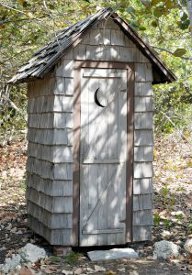United Families Dividing Churches
 Reprinted with permission from Faith Pulpit (Jan-Mar, 2012)
Reprinted with permission from Faith Pulpit (Jan-Mar, 2012)
Discussion
"We don’t need more self esteem programming with a little religious language."
Body
Discussion
The Case for Family Field Trips

Spring is close at hand! Though the winter was mild, we find ourselves yearning to shake the bonds of our winter domiciles and romp free in a sun-bathed world of lush vegetation and balmy temperatures. The heavens locked in wintry gray are already giving way to azure skies arrayed with billowing clouds of cottony-white. This means that prime exploration season is just around the corner!
I now refer to excursions into nature as “field trips.” Years ago I referred to them as “family vacation.” But with three teens and a tween in our home, I’ve learned the importance of truth in advertising. The kids protested that dad’s definition of “vacation” left scant room for lazy repose and frivolous entertainment. Our so-called “vacations” were chock-full of things like forced marches, challenging sleeping conditions, and unmitigated exposure to fresh air and rugged earth. Guilty as charged! So I changed the nomenclature to “field trips,” which I contend offer substantial benefits. Tremendous rewards accrue to those willing to leave behind the hustle and bustle of everyday life and explore the wild wonders of nature.
God’s glory
First, exploring nature is a singular means of witnessing the glory of the God who created heaven and earth. From pole to pole “the heavens declare the glory of God, and the sky above proclaims his handiwork” (ESV, Psalm 19:1). Nature is a canvas on which God reveals His splendor and power (Rom. 1:19-20). To explore nature is to cavort in the cathedral of God’s creative artistry and design: climbing mountains and basking in the vistas below; hiking rugged trails under the leafy boughs of towering trees; exploring waterfalls that tumble with violent force into murky basins; frolicking in the ocean’s surf to the symphonic strains of crashing waves and screeching gulls; watching the sun set across a placid lake as loons echo their haunting cry; trudging upland against the flow of a gurgling creek; exploring the dank, earthy splendors of a cave; star gazing in a remote field unspoiled by the glow of city lights; being mesmerized by the dancing flame of a cracking campfire as the wind stirs the chords of pine needles overhead. Such explorations into nature enrich and stabilize the soul, particularly when such wonders are received as a gift from nature’s Artificer (Gen. 1:31).
Discussion
Standard of Living?

One of the most telling characteristics of our culture is how we collectively determine an individual’s standard of living. The concept of a “standard of living” is something like a high-jump bar by which we gauge the quality of our daily lives. Some people cannot clear the bar and we say they experience a “low standard of living.” Others clear the bar with considerable room to spare and we declare that they enjoy a comparatively “high standard of living.” Those who fall between these two sub-sets keep jumping, but never seem quite sure if they clear the bar or not.
Irrespective of how high we are able to jump, one thing is certain: our culture naturally defines standard of living in terms of economic prosperity. The bar by which we gauge standard of living is hoisted to its current height by prevailing economic conditions and expectations and then we orient ourselves toward attaining that height—and then some.
It is interesting to observe that the bar which distinguishes between high and the low standards of living has been steadily elevated throughout the latter half of this century. As case in point, I recently enjoyed an evening meal with my extended family. It was one of those summer time delights—grilled chicken breast, calico bean dish, corn on the cob, fresh baked rolls, potato salad and iced tea. Wow! The conversation among the elders at the table turned (as only an intimate family can turn it) to middle-of-the-winter trips to the outhouse. This topic veered off ever so naturally into a discussion of the history of toilet paper, when, on cue, my mother divulged her recurring account of the days her family could not afford said fibrous luxury. As the account always goes, she reminded us of the qualities of various alternative sources of “paper” that were used for this daily duty. (It seems that the wrapping on summer peaches was the paper of choice. My mother still speaks as if peach season were Nirvana.) I went home that night very thankful that the standard of living in America has improved so dramatically.
It is certainly not just toilet paper that has improved our living standard over the course of the twentieth century. Add to the list almost anything: from houses and cars to communication systems and the myriad of technological advances over previous generations.
Yes, in almost every way our standard of living has dramatically improved; if, that is, we blindly accept the prevailing criterion by which that standard is determined. I would like to propose that we should not so readily accept this criterion.

Discussion